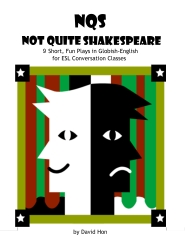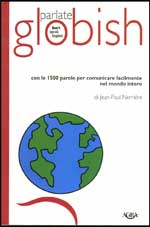<p style="text-align: justify;">The first document, found on the Web in this very shape and wording, is in English. It is the first two pages of a text available on Wikisource ("http://en.wikisource.org/wiki/Author:William_James" o "Author:William James" ).</p>
<p style="text-align: justify;">116 of its words (15% of the total) are too complicated or too rare to be understood by all non native English speakers. Globish would enjoy a better impact around the world.</p>
<p style="text-align: justify;">The second document, in italics, tells the same story in Globish. Only 8 different words (1%) do not belong to the Globish list, or the words derived from it. They have to be kept in order to keep the overall meaning, and they are likely to be understood by most foreigners: "metaphysics, philisophy, litterature, etc,."</p>
<p style="text-align: justify;">First document:<br />The Ph.D. Octopus.<br />From Wikisource</p>
<p style="text-align: justify;">Some years ago, we had at our Harvard Graduate School a very brilliant student of Philosophy, who, after leaving us and supporting himself by literary labor for three years, received an appointment to teach English Literature at a sister-institution of learning. The governors of this institution, however, had no sooner communicated the appointment than they made the awful discovery that they had enrolled upon their staff a person who was unprovided with the Ph.D. degree. The man in question had been satisfied to work at Philosophy for her own sweet (or bitter) sake, and had disdained to consider that an academic bauble should be his reward.<br />His appointment had thus been made under a misunderstanding. He was not the proper man; and there was nothing to do but inform him of the fact. It was notified to him by his new President that his appointment must be revoked, or that a Harvard doctor's degree must forthwith be procured.<br />Although it was already the spring of the year, our Subject, being a man of spirit, took up the challenge, turned his back upon literature (which in view of his approaching duties might have seemed his more urgent concern) and spent the weeks that were left him in writing a metaphysical thesis and grinding his psychology, logic, and history of philosophy up again, so as to pass our formidable ordeals.<br />When the thesis came to be read by our committee, we could not pass it. Brilliancy and originality by themselves won't save a thesis for the doctorate; it must also exhibit a heavy technical apparatus of learning; and this our candidate had neglected to bring to bear. So, telling him that he was temporarily rejected, we advised him to pad out the thesis properly, and return with it next year, at the same time informing his new President that this signified nothing as to his merits, that he was of ultra-Ph.D. quality, and one of the strongest men with whom we had ever had to deal.<br />To our surprise we were given to understand in reply that the quality per se of the man signified nothing in this connection, and that the three magical letters were the thing seriously required. The College had always gloried in a list of faculty members who bore the doctor's title, and to make a gap in the galaxy, and admit a common fox without a tail, would be a degradation impossible to be thought of. We wrote again, pointing out that a Ph.D. in philosophy would prove little anyhow as to one's ability to teach literature; we sent separate letters in which we outdid each other in eulogy of our candidate's powers, for indeed they were great; and at last, mirabile dictu, our eloquence prevailed. He was allowed to retain his appointment provisionally, on condition that one year later at the farthest his miserably naked name should be prolonged by the sacred appendage the lack of which had given so much trouble to all concerned.<br />Accordingly he came up here the following spring with an adequate thesis (known since in print as a most brilliant contribution to metaphysics), passed a first-rate examination, wiped out the stain, and brought his College into proper relations with the world again. Whether his teaching, during that first year, of English Literature was made any the better by the impending examination in a different subject, is a question which I will not try to solve.<br />I have related this incident at such length because it is so characteristic of American academic conditions at the present day. Graduate schools still are something of a novelty, and higher diplomas something of a rarity. The latter, therefore, carry a vague sense of preciousness and honor, and have a particularly "up- to-date" appearance, and it is no wonder if smaller institutions, unable to attract professors already eminent, and forced usually to recruit their faculties from the relatively young, should hope to compensate for the obscurity of the names of their officers of instruction by the abundance of decorative titles by which those names are followed on the pages of the catalogues where they appear. The dazzled reader of the list, the parent or student, says to himself, "This must be a terribly distinguished crowd,-- their titles shine like the stars in the firmament; Ph.D.'s, S.D.'s, and Litt.D.'s bespangle the page as if they were sprinkled over it from a pepper caster."</p>
<p style="text-align: justify;">Second document.<br />The Ph.D. (doctor's degree) debatable influence and power.<br />Transformed into Globish from a Wikisource text.</p>
<p style="text-align: justify;">Some years ago, we had at our Harvard Graduate School a very bright student of Philosophy. He left us and supported himself by literary labor for three years. He then received an appointment to teach English Literature at a sister school. However, the governors of this school had just communicated the appointment when they made a terrible discovery: they had as an employee in their team a person who was not provided with the Ph.D. degree. This in question had been satisfied to work at Philosophy for his own sweet (or unpleasant) reward, and had decided that a university paper was not worth much as a reward.<br />As a result, his appointment had been made under a misunderstanding. He was not the man needed; and there was nothing to do but inform him of the fact. He was told by his new President that his appointment must be canceled, or that a Harvard doctor's degree must be produced immediately.<br />It was already the spring of the year. But our Subject was a man of spirit. He took up the challenge. He turned his back upon literature (which in consideration of his upcoming duties might have seemed his more urgent concern). He spent the weeks that were left him in writing a metaphysical thesis and working hard again on his psychology, logic, and history of philosophy. This was to pass our complex exams.</p>
<p style="text-align: justify;">When the thesis came to be read by our committee, we could not pass it. Brightness and freshness by themselves won't save a thesis for the doctorate; it must also demonstrate a heavy technical content of learning; and our candidate had forgotten to show that. So, we told him that he was rejected for the time being; and we advised him to improve the thesis correctly, and to come back with it next year. At the same time we informed his new President that this meant nothing as to his skills, that he was above Ph.D. quality, and that he was one of the strongest men with whom we had ever had to deal.<br />The answer surprised us: it told us that the deep quality of the man meant nothing in this connection, and that the three super-natural letters were the thing seriously required. The College had always been honored by a list of university members who enjoyed the doctor's degree. To make a hole in this world, and admit a common dog without a tail, would be a damage impossible to be thought of. We wrote again. We pointed out that a Ph.D. in philosophy would prove little anyhow as to one's skills to teach literature; we sent separate letters in which we outdid each other in praising our candidate's powers, for they were really great; and at last, our well argued case won. He was permitted to keep his appointment for a period of time: the condition was that one year later, at the farthest, his poorly simple name should be extended by the holy addition without which so much trouble had been given to all concerned.<br />As expected, he came up here the following spring with an acceptable thesis (known since in print as a most bright gift to metaphysics). He passed a first-rate examination, cleaned out the mistake, and brought his College into right relations with the world again. But there is a question which I will not try to solve: during that first year, was his teaching of English Literature made any the better by the upcoming examination in a different subject?<br />I have discussed this incident in such long lines because it tells you so much about American university conditions at the present day. Graduate schools still are something new, and higher degrees something rare. These degrees, as a result, carry a certain sense of value and honor. They have an especially "up- to-date" look. Smaller organizations are often unable to draw the interest of professors already important, and they are forced usually to find their needed skills from the more or less young: they hope to make up for the unknown names of their teachers by the plentifulness of shining degrees by which those names are followed on the pages of the presentations where they appear. The blinded reader of the list, the parent or student, says to himself, "This must be a terribly upper and famous team-- their degrees shine like the stars in the sky; Ph.D.'s, S.D.'s, and Litt.D.'s cover the page as if they were spread over it from a salt box."</p>

Rubriques disponibles
Winners speak Globish
An ebook by Elisabeth Noble
Une Anglophone de naissance consacre un livre au "Globish", facile à lire, bien documenté, plein d'anecdotes et d'observations inédites.
A commander sur www.smashwords.com

A native English speaker wrote a book about "Globish". It is full of anecdotes, easy to read even for non Native English speakers, and it gives a fair and balanced representation of the Globish concept.
Order at www.smashwords.com
Visiteurs
 31,5%
fr-FR
31,5%
fr-FR
 18,1%
United States
18,1%
United States
 6,1%
Canada
6,1%
Canada
 5,9%
Germany
5,9%
Germany
 5,3%
Singapore
5,3%
Singapore
Total: 123 Pays |
2829731
|
|
Translations of Globish The World Over
Globish IN Globish - (GNG)
Globish IN Globish est un cours en auto-apprentissage facile à utiliser tout autant sur un ordinateur que sur n’importe quel téléphone portable muni d’une connexion à Internet. Pour l’utiliser, il vous faut être capable de lire et comprendre les 35 mots les plus communs en anglais, et donc repris en globish (les tests ont montré que ceux qui avaient quitté l’école le plus tôt possible maîtrisaient 850 mots d’anglais, ne serait-ce que parce que nous les utilisons dans le quotidien du français). Dès que vous pensez en dominer plus que 350, vous pouvez débuter au niveau que choisirez, en rapport avec votre capacité.
Les deux premières leçons vous sont offertes gratuitement sur tout ordinateur muni d’un accès à internet.
En travaillant exclusivement en globish, vous pouvez rapidement apprendre la grammaire, et des mots nouveaux, avec leur prononciation, dans le cadre d’une histoire contextuelle. L’apprenant qui arrive au terme de Globish IN Globish devrait se trouver parfaitement à l’aise du niveaux B1-B2 attribués par le « Common European Framework of Reference for Languages » (CEFR).

Globish IN Globish is an extensive self-study course in Globish that is easy to use on either any standard computer with Internet capability. To use it you must be able to read the most-common 350 words in Globish/English. Then you can begin at any point that matches your ability. Try the first two lessons now, for free, on either your mobile phone or on a computer that has Internet.
By working only in Globish, you can quickly learn both grammar, and new words with pronunciation, in a story context. The student who completes Globish IN Globish should be quite capable at B1-B2 (English) levels given by the Common European Framework of Reference for Languages (CEFR).
Not Quite Shakespeare - (NQS)
Not quite Shakespeare (« pas tout à fait du Shakespeare ») est une collection de 9 courtes pièces de théâtre, rédigées entièrement en Globish, avec le vocabulaire original des 1500 mots recommandés. Elle est destinée aux enseignants qui souhaitent mobiliser des classes sur la conversation. NQS donne aux étudiants des rôles à jouer, et les amène dans des domaines d’expression dépassant largement « je vais chez le boulanger acheter le pain ». Ces documents fonctionnent très bien pour la prononciation, d’autant plus que l’apprenant est ici traité comme un acteur, et non plus que comme un étudiant.
Cliquez ici pour une démonstration gratuite, Auditions for God, sous forme de publication électronique dont vous est laissée toute liberté d’usage. « Auditions For God » se joue avec quatre personnages, et ne nécessite rien de plus qu’un pièce pour lire et jouer la pièce. Comme il convenait dans les pratiques du Moyen-Âge, le rôle de Dieu est le mieux rémunéré, et de nombreux acteurs se présentent en audition pour le rôle. Finalement Dieu se porte candidat en personne (et n’est pas vraiment très bon..)

Not Quite Shakespeare is a collection of 9 short, proven plays in 1500 Globish words, for teachers who want to involve their large English-Conversation classes. NQS gives students proven real plays whose subject matter goes far beyond the usual role plays like "going to the store and buying bread". It also works very well for pronunciation tutoring, as the student is treated as an actor with a performance to give, rather than as a student.
Click here to try a free play, Auditions for God, in e-book form, which you may copy and use as you wish. “Auditions For God” is for four characters and needs nothing but a room to read or perform. Based on actual medieval practices, the role of God receives the highest pay, so many actors come to audition for the role. Finally, God himself auditions. (He's not very good.)
President Obama’s Inauguration Speech.
Vous trouverez ci joint la transcription en Globish du discours d'investiture du Président Barak Obama.
Cette transcription est faite en parallèle du texte originel
Bonne lecture

You will find here the speech given by President Obama for his inauguration January 20th, and also its transcription in Globish. The latter would be readily understood by a much larger number of non Anglophone like foreign citizens and immigrants. We hope you enjoy the reading.
Éditions internationales

 Les deux éditions
Les deux éditions
parues en Corée Parution en Italie
Parution en Italie Parution en Espagne
Parution en Espagne
 Les deux éditions
Les deux éditions
parues en chine.

 Globish
Globish Japanese
Japanese Chinese
Chinese Spanish
Spanish


